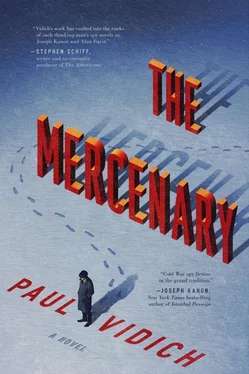“So many questions.”
Garin glanced back down the staircase and looked for an escape route, if needed. Instinct and experience made him cautious. She walked ahead in darkness, like a ghost.
Natalya hit the vestibule wall switch inside her third-floor apartment, and the living room filled with dim light from a Venetian chandelier above a mahogany dining table. He was struck by the apartment’s size and grandeur. A worn Chinese rug lay on the parquet floor, and set against one wall was a claw-foot sofa of worn crimson velvet. Against the opposite wall was a French Empire breakfront with crystal glasses and stacked dishes.
Garin tried to make sense of the objets d’art obviously collected over a lifetime. He lifted a porcelain vase of exceptional craftsmanship, and when he looked closer, he saw the glue lines where it had been poorly repaired. When his first impression passed, he saw everywhere the hints of a place that had fallen on hard times. The wall paint was yellowed with age and flaked in spots, parquet squares were loose, and the beveled wall mirror was cracked. Several dark wall sconces were empty of replacement lightbulbs. Twined newspapers were stacked in one corner beside empty glass jars saved for the occasion when a use presented itself. He noticed the duality of the apartment—the richness of a time capsule that helped make its present poverty less visible.
“This was my grandfather’s flat. He got that vase in Germany.” She placed her shearling coat on a closet hanger and invited him to do the same. “Drink?”
“Vodka.”
“I have port wine. I’ll bring two glasses. We’ll drink a little, talk a little. You can tell me why you are in Moscow.”
She returned in a moment from a hidden room, holding two glasses and a decanter. He was standing at a wall of framed photographs. A young Soviet Army officer in uniform was standing in the turret of a T-62 tank among a group of shirtless enlisted men with ammunition bandoliers draping their necks and beer in their hands, mugging. He was tall, dark-haired, with fierce, commanding eyes.
“My brother,” Natalya said, seeing Garin’s interest. She poured modest portions of port. “ Zdorovye. ”
Garin nodded at the photograph. “Does he live here?”
“He’s dead. Last year, in the mountains outside Kabul. A mujahideen rocket hit his tank.”
He turned and looked at her.
“We were close.” She abruptly turned away. The room was cold, but she’d lit a kerosene heater when she entered, and it put out meager warmth. She stood by it. “It’s warmer here. The heat goes off before midnight. Do you like the apartment?”
“No one lives like this in Moscow.”
“My father had a good position, and he kept it when Grandfather died. We were three generations. Now it is only me.” She nodded at the photograph. “He was a brave soldier and a stupid patriot.” She looked at Garin. “And you? Tell me something that will surprise me.”
Garin sniffed the port.
“It’s local. Not good, but not poison. So,” she said. She didn’t finish her thought and suddenly went to the sofa, relaxing into the cushions and stretching her long legs onto a Turkish hassock. She patted the sofa. “Sit. My father collected things on his foreign postings. He collected the Meissen porcelain in Dresden after the war. And you,” she said, “where did you learn Russian?”
He sat beside her. “As a child.”
“An émigré? That makes sense.” She sat up, dropping her legs from the hassock, and took the glass he had placed on the coffee table. “May I?” She took the amber liquor in two quick swallows and looked at him with curiosity. “You speak Russian, but you’re not a real Russian. You’re difficult. I don’t understand you.”
She snuggled against him. “It’s cold. Put your arm around me.”
He did, and they sat together in silence for a moment. Then she pulled away and looked at him. She began to undo the top button of her silk blouse, and her eyes dropped to the second button, which she also undid. Her fingers fumbled nervously.
“I want to do this,” she said, her eyes averted. “Everything else will go away. You will leave. But we will have this evening.”
He saw her nervous excitement, her defiance, and her fear. She had rehearsed well, he thought. He felt her hand on his, taking it gently and placing it on her neck. He knew she was acting. Acting, but not acting?
They moved to the bedroom, and in letting her guide him forward, he looked for the silvered smokiness of a two-way mirror or a hidden microphone. His ears were alert for the soft click of the front door closing.
She had stepped out of her black skirt and removed her stockings, which she placed carefully over the back of a chair. She leaned forward, reaching behind to undo her bra, and laid it by the dress. She stood before him naked—alive with apprehension. Her fingers worked to undo his belt buckle, her eyes meeting his, and he struggled out of his shirt, working an uncooperative button. She admonished him with a whisper: “Slowly.”
Her body was as pale as milk and thin, but with the sinewy strength of a dancer. He found her performance amateurish, which was attractive in its own way, and she seemed ignorant of how to help him along. He saw sullen urgency in her movement, and he admired her willingness to take a risk. For one frightening moment, he felt a terrible attraction.
Her hand was on his arm, slowly moving along the scar on his neck, feeling its contours. She kissed his lips with a passion he was returning, and she continued until she coaxed his ardor and he relaxed the vigilance that was a reliable companion when he sensed danger nearby. Her eyes closed, and her body moved with the frothy passion of an inexperienced lover. In the back of his mind, he heard someone enter the apartment.
“You would be more beautiful without your fear,” he said.
“A stupid, romantic thing to say,” she whispered in his ear. “I’m not a romantic.”
Two men burst into the bedroom, bringing a confusing kaleidoscope of sensations. Bright overhead light washed everything in harsh illumination; shouted instructions came fast, and he smelled violence on the men who took him. He was naked, and his arms were pinned behind his back. In the midst of the drama, he struggled to look shocked and embarrassed. His cheeks purpled with anger, and he stared indignantly into the beefy, thick-necked faces of two KGB.
Garin caught a glimpse of Natalya. She had hurriedly wrapped herself in a bedsheet and was rushing from the room. Garin twisted his head toward the two men holding him. They were professionals who knew how to immobilize without leaving marks on his body.
“Shitheads,” he grunted.
Both men stepped aside, and Garin saw a third man standing in the doorway. What struck Garin first was the man’s nonchalance, and then Garin noticed the unpleasant way he had of looking at Garin with predatory interest.
“Don’t struggle,” Comrade Posner said. He drew on his cocktail cigarette holder and released smoke from the corner of his mouth. “You might bruise yourself.”
Garin felt the man’s gaze like a fashion designer evaluating a model on a runway.
“You won’t look good bruised. Someone will ask what happened, and you’d have to come up with a believable story. You are better unmarked.” He threw Garin’s clothes at him. “Get dressed.”
Garin shoved his legs into pants and his arms in his sleeves, buttoned his shirt, and sat on the bed to put on his socks. He focused on his clothes, but his mind calibrated what would come next and how he could use his jeopardy to his advantage. Nothing so far had surprised him. Then Posner added the predictable details: a microphone in the lamp, the record of the encounter, the hidden camera with a lens that looked through a small dark hole in a black-and-white oil canvas on the wall. “It’s one of Golukov’s,” Posner said. “We had to damage the painting, but you are worth the cost.”
Читать дальше












